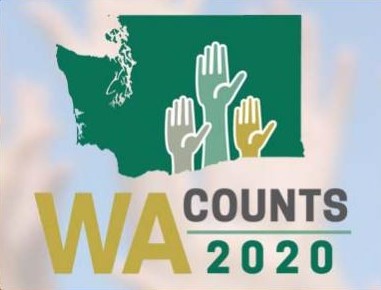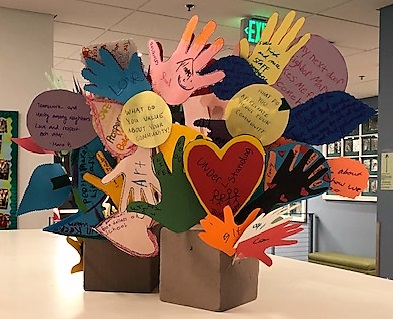
By N.L. Sweeney
Just once every 10 years, the United States conducts a census to count how many people are in the country. The results decide, among other things, government representation in Washington, D.C., and funding for a number of federal programs. In other words, the accuracy of the census matters.
Answering the call to help the census do its work this year were faculty and students at University of Washington Bothell.
Led by Gary Carpenter, a lecturer, and Charlie Collins, an assistant professor, both in the School of Interdisciplinary Arts & Sciences, students in two winter-quarter courses partnered with local organizations with the goal of making a change in the census process this year.
The UW Bothell Census Committee promoted participation with its “We Count” video, also available through the ACT (Achieving Community Transformation) Facebook page.
“The census is crucial for all communities in terms of services, representation and funding,” said Carpenter. “It impacts all of us — but particularly the marginalized communities who are also the least likely to complete the census out of fear or lack of information.
“That is precisely why it is so important for students to get involved.”
Beyond the classroom

Carpenter’s course was titled Creative Activism: Inspiring Change through the Arts. Collins’ course in the Master of Arts in Policy Studies program was called Policy Studies Practicum. Both courses, while different in focus, sought to impress upon students the importance of the census and the implications of inequity in representation.
Both courses centered around field work in the community, but they both began in classrooms on the UW Bothell campus. “With our course, we began by laying a strong foundation of terms and theory,” said Collins. “That way, when we went out into the community, we would have an informed way to view our interactions with the organizations.”
Collins’ students partnered with Homage, Ustav and Gambian Talents. Each of these organizations advocates for underrepresented groups of people who tend to receive less funds from the government. “Students led focus groups and coordinated with organizations to find ways to create space for these people,” said Collins.
In Creative Activism, students applied their knowledge of the applicability of art to census projects with three other community partners: Ronald Commons, the city of Bothell and the city of Kenmore.
“As most often occurs with these projects, students had to think on their feet and alter plans as the project unfolded in real time,” said Carpenter. “They did this all while meeting their intended outcomes of community building and raising awareness about the census and how it can benefit the people they were working with.”
Getting involved
One of the greatest parts of teaching a class that steps outside of the traditional lecture model is that it allows students to put theory into practice. That said, practice can often be less clear and defined than theory, said Collins.
For Giavanna Anguiano, a master’s student in the Master of Arts in Policy Studies program at UW Bothell, Collins’ class allowed space for this sort of natural development.
“This entire program and our classes have emphasized reflection and realizing your mistakes and learning from them,” said Anguiano. “Our focus on developing relationships and focusing on how we did a thing rather than the end result of our findings made our interactions more wholesome for us and our partners.”
Anguiano was in the group that worked with Homage, an organization that works with multi-cultural seniors, many of whom don’t speak English as their first language. The students’ assignment was to address the question: What are the barriers to completing the survey for seniors?
“We found in our research with our Filipino and Korean focus groups that education and accessibility were the biggest obstacles,” said Anguiano. “So, we walked people through the process of completing the census, made additional flyers and created a brief survey for Homage to use to see what sort of resources they might need, especially during the time of COVID-19.”
Reaching out
For both Carpenter and Collins, the courses were about more than teaching about the functions of the census to allocate government funds. “I wanted students to understand the ways that accessibility and inequality interact with social justice and access to resources,” said Collins.
This focus made a difference for students like Anguiano.
“This class taught me how to approach people while acknowledging my position as an outsider,” said Anguiano. “I learned to make space for their experience rather than trying to impress my opinions onto their responses.”
Other students like Jasmine Tasakos, a first-year student intending to pursue an engineering degree, found Carpenter’s course enlightening. “This was the first class I’ve taken that really made me open up and think about other people,” said Tasakos. “And not just about other people, but about the way my actions can have an impact on other people.”
That’s just the impact Carpenter hopes these courses and doing research in the field will have on students.
“Beyond understanding the importance and function of the census,” said Carpenter, “I hope that students leave with a greater understanding of how to explore social issues from a variety of perspectives and that they have a sense of agency in their own ability to impact, educate and inspire others locally, nationally and globally.”



